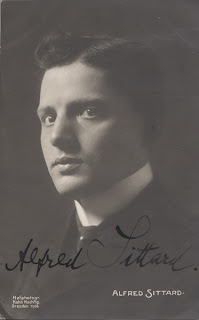
Cathedral Organist Niels Otto Raasted might need a little introduction to non-Danish organists. The danish organist Niels Otto Raasted (1888-1966) was one of the leading – if controversial – church musicians of his time. After studies in Leipzig with Karl Straube and Max Reger he was appointed organist at the Church of Our Lady in Odense in 1915-24 and Cathedral Organist in Copenhagen in 1924-58, where he started the tradition of broadcast morning services. In 1925 he founded the Bach Society, and he was chairman of the composers’ rights organization KODA in 1937-64. He was moreover an active concert organist and organ teacher. As a composer he kept up a high output of works throughout his life, totaling 116 opus numbers, especially organ works (six sonatas in 1917-48), choral music (Mass 1924), hymn tunes, chamber music and orchestral works (three symphonies). In his own lifetime his music was performed frequently, especially in Denmark and Germany. The early works were romantic in s...


